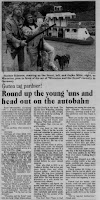Round up the young ‘uns and head out on the autoban
The Daily Advertiser
Lafayette, Louisiana
June 25, 1996
BAD SEGEBERG, Germany (AP) A bank-robbing polecat named Gibson has tied a pretty gal named Rose to the railroad tracks. Comanches have swooped down on a U.S. Cavalry fort and a frontier scout called Old Death has died in the arms of his Apache sidekick. His dying words: “Lebewohl, alter Freund.”
Whoa, pardner, what country is this?
Germany.
Germans are crazy about cowboys and Indians, possibly more so than Americans. They show it each summer by rounding up their young ‘uns and heading out on the autobahns for Karl May Plays: nine weeks of melodramas performed by professional actors at a mock Wild West village.
Every season the actors gather in an abandoned lime quarry in this town near the Baltic Sea and perform a different work by May, a 19th-century novelist. The 1996 Karl May Plays opened Saturday with “Winnetou and the Scout.”
American words sprinkled into the dialogue were a mite pesky for some of the 7,000 Germans watching from wooden bleachers over-looking the arena.
Questions flew out of 5-year-old Karolin Zloesch’s mouth as fast as bullets from a Winchester carbine.
“What’s a revolver? What’s a Comanche? What’s a greenhorn”
Her pa has been coming to these plays since he was knee-high to a grasshuepfer, German for “grasshopper.” So he had all the answers.
“Winnetou and the Scout” ends with the bank robber Gibson shooting Old Death in the back. The Apache hero Winnetou, standing far away on top of a cliff, avenges his friend’s death by picking off Gibson with one shot.
Tears are shed in the bleachers as the dying Old Death tells Winnetou: “Farewell, old friend.”
The author, May, was one colorful hombre.
He was born in 1842 near Dresden. While in his 20s, he stole cash and valuables by posing as a professor, a doctor and a policeman. He once stole a horse and rode it across the countryside with the law on his tail, like one of his fictitious characters.
May had two stints in prison, totaling seven years. He swapped his con-man career for that of a novelist, writing dozens of easy-to-read adventure books. Many, such as “Winnetou the Red Gentleman” and “Old Surehand,” are legends about the Old West that May concocted before he ever visited America.
May, who died in 1912, is no Goethe or Schiller. But he has sold more books than any other German author – more than 80 million. His fans have included Albert Einstein, Helmut Kohl and Adolf Hitler. The Nazi dictator saw Winnetou as a role model for German army officers.
May remains a colt figure. His stories have been told on records, in radio plays, and in a series of 1960s movies filmed in Croatia, with waterfalls and snowy peaks standing in for the scenery of the American West.
The Karl May Plays in Bad Segeberg are among the most popular summer attractions in Germany, drawing nearly 6 million spectators since they began in 1952.
There are similar May theatrical productions in at least nine other German communities.
Various theories have been offered abut Germans’ attraction to May. One is that Germans feel an affinity with their ancestors who immigrated in waves to the American West in th e 1800s.
Nostalgia also has a role.
German children have been weaned on Karl May books for a century. When they get older these stories are among their most cherished memories.
Take 56-year-old Joern Funck, who was at the Bad Segeberg play.
He’s been smitten by the Wild West ever since reading May’s books as a kid.
Funck was dressed in a complete cowboy outfit: a hat and boots, rawhide vest, chaps, spurs and a Bowie knife he bought in El Paso, Texas.
Funck makes a living as a doctor. But he and 49 others also have a cooperative cattle ranch in Schleswig-Holstein, the German state where Bad Segeberg is located.
Funck and his buddy, Olaf Kruck, tend the herd just like the American cowboys – riding the German range on quarter horses in their cowboy duds. They’ve also gone on cattle drives in the United States.
“We’re regular buckaroos,” Funch said.













No comments:
Post a Comment